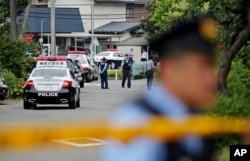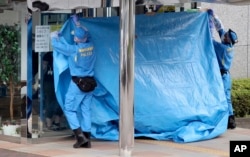The brutal mass killings committed at a facility for the disabled in Japan illustrates the difficulties that even nations with low crime rates, strict gun control and restrictive immigration policies face in trying to prevent attacks from seemingly deranged individuals.
Japanese authorities say they are investigating the motive of the lone knife-wielding attacker who broke into the Tsukui Yamayuri-En facility for disabled people early Tuesday, killing 19 residents and wounding dozens more.But they have ruled out terrorism as the cause.
"We received information from the police that there is no evidence of the attacker being related to Islamic State," said Yoshihide Suga, the Japanese government’s spokesman and Chief Cabinet Secretary.
Police in Sagamihara City, Kanagawa Prefecture, about 40 kilometers southwest of Tokyo, have arrested Satoshi Uematsu, a 26-year-old former employee at the facility, Japanese media reported.
Uematsu, wearing a black tee shirt reportedly turned himself into the police and the Asahi Shimbun newspaper said he told police, "I want to get rid of the disabled from this world." The Japanese state broadcaster NHK reported that police recovered a bag with several knives, at least one stained with blood.
News of the mass killings has shocked the nation. The facility cares for more than 150 people with a range of disabilities."I just want to know why this happened, the cause of it. It is something that could happen anywhere, and these cases always have to do with human relationships,” said Naomi Takano, who lives nearby.
Low crime rate
Japan has one of the lowest violent crime rates in the developed world.
Gun related homicides in particular are rare due to the country’s strict regulations that limit gun ownership, and require gun permit applicants to undergo extensive training, criminal background checks and mental health screenings.
Japan banned possession of double-edged knives longer than 5.5 centimeters after a mass killing in 2008 when a man stabbed shoppers in Tokyo after he drove a rental truck into a crowd and killed seven people and injured 10 others.
Tokyo’s restrictive immigration policies, especially when it comes to refugees from conflict areas of the Middle East, have also isolated the country from some of the terrorism related violence affecting Europe and the U.S.
Human rights groups however have criticized Japan for not doing more to help refuges and economic analysts say the country needs increased immigration to replace the country’s rapidly aging population.
Disable and elderly attacks
Still in Japan there have been a number of recent attacks on the disabled and elderly.
“In Japanese society, such murder incidents, or so called 'don't ask murders,' happen quite often involving perpetrators who are not related to the suspect, targeting disadvantaged people such as women and disabled,” said Hosaka Yuji, a Japan analyst and political science professor at Sejong University in Seoul.
Last year, five elderly people were stabbed to death during an attack in the city of Sumoto.
In February a former nursing home worker was arrested for allegedly throwing an 87-year-old resident from a balcony to his death.
Prior to Tuesday's attack, a 1995 Sarin gas attack on the Tokyo subway system was the worst mass killing in the country since World War II.Members of a Japanese Doomsday cult killed 13 people and caused thousands of commuters to fall ill during that attack, which cause widespread fear in the country.
Youmi Kim in Seoul contributed to this report.







